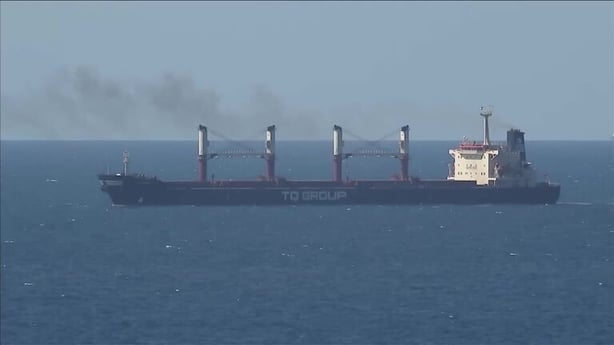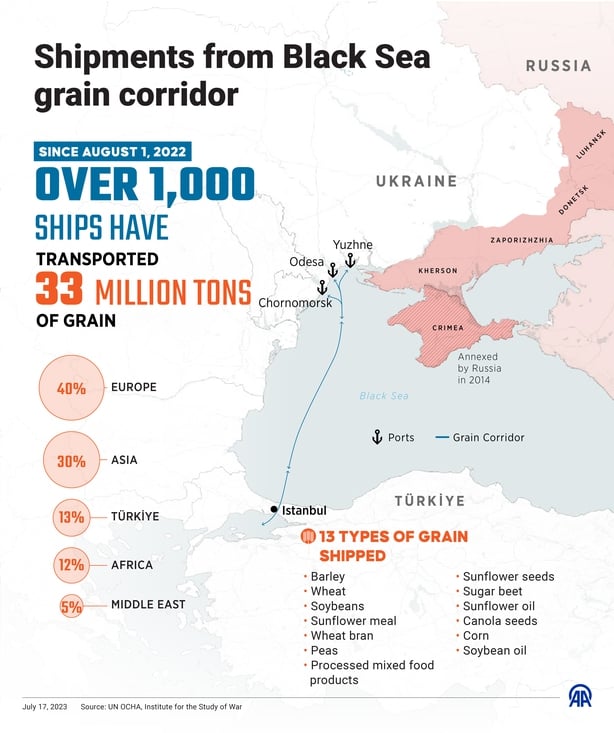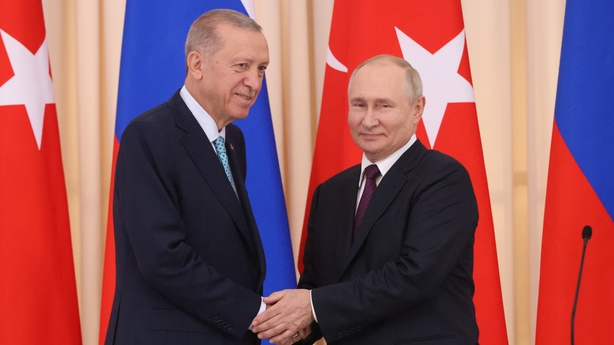Russian President Vladimir Putin and his Turkish counterpart Recep Tayyip Erdogan met in Sochi yesterday to discuss the Black Sea Grain Initiative, which Moscow withdrew from in July.
The initiative, brokered by Turkey and the United Nations in July 2022, enabled Ukraine to resume grain exports via three of its ports, Odessa, Pivdennyi and Chornomork, which had been blockaded by Russian warships since Moscow's invasion began in February 2022.
Exports of Russian fertiliser and grain were also allowed to be transported as part of the deal.
Russia’s blockade at the start of the war led to approximately 20 million of tonnes of grain, bound for export, to pile up in Ukrainian port warehouses for the first four months of the war.

That drain on supply pushed global wheat prices higher, from $390 per metric tonne in January 2022 to more than $520 per metric tonne by May 2022.
Ukraine is one of the largest producers of grain in the world. It accounts for about 10% of the world's wheat so the jump in wheat prices was not entirely surprising.
Global maize prices, which are generally less volatile than wheat, saw smaller increases.
The establishment of so-called 'solidarity lanes' for Ukrainian grain exports – rail and road routes in the European Union – helped to stabilise prices slightly but that scheme has since run into opposition from eastern EU member states, fearful that cheaper Ukrainian imports are lowering prices in their own domestic grain markets.
However, it was the Black Sea deal that brought market prices back to pre-war levels by August 2022, just one month after the start of the initiative.

The deal itself allowed cargo ships to transit south via Istanbul’s Bosphorus Strait, a shipping route that Turkey oversees.
Inspections were carried out by Turkish, UN, Ukrainian and Russian teams to make sure that the ships were only carrying foodstuffs.
However, Moscow quit the deal in July claiming that its own food and fertiliser exports faced obstacles, and that not enough Ukrainian grain was going to developing countries.
By that stage, the average number of daily cargo ships carrying food exports had fallen to three, compared to 11 ships per day in October 2022.
Russian forces have since resorted to bombing grain storage facilities in the Odessa region and Ukraine’s port cities.
And this week, Russia bombed the Ukrainian port city of Izmail, a key grain export hub on the Danube River.
Yesterday in Sochi, Mr Putin said that Russia would be willing to renew the deal provided all agreements relevant to the accord are fulfilled, while Mr Erdogan, the leader of NATO member state Turkey, said that he thought the deal could be revived.

The main bone of contention may be Moscow’s demand, as reported by the Financial Times in July, for the Russian Agricultural Bank to be reconnected to the SWIFT payment system. This would enable Russia to collect payments for its own grain exports more easily.
Like all major Russian banks, Russian Agricultural Bank was banned from SWIFT under EU and other Western sanctions, in the weeks following the invasion of Ukraine.
The UN and its agencies dealing with food scarcity are keen to see the initiative restored.
During the 12 months that the deal was in existence, almost 33m tonnes of grain and other foodstuffs were exported, according to the UN’s data.
For context, Ukraine exported 48m tonnes of grain in the 12 months from June 2021 to June 2022, which was effectively a nine-month period because Ukrainian ports were blockaded from March to June that year.
Maize accounted for just over 50% of exported cargo during the 12 months that the Black Sea deal operated, with wheat accounting for 27% of the total volume of exported cargo, and sunflower products, 10%.
About 65% of all wheat exports were sent to developing countries.
China was the biggest importer of Ukrainian grain, followed by Spain, importing 8m and 6m tonnes respectively, during the deal’s lifetime.
Ireland imported a relatively small amount of Ukrainian grain – 60,000 tonnes according to the UN – during the same period.
Ukraine's foreign minister Dmytro Kuleba said he expected his country's President Volodymyr Zelensky to talk to Mr Erdogan following the Sochi talks.
Additional reporting by Reuters







